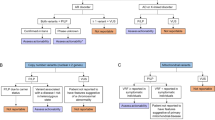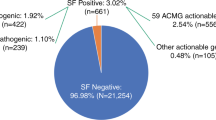Abstract
Whole-genome/exome sequencing used in clinical trials (CTs) to identify ‘druggable’ mutations and targets uncovers incidental findings unrelated to the trial objectives but of value for participants, although ethically challenging. To be disclosed to trial participants, the analytical validity, clinical validity, clinical utility, clinical relevance and actionability of incidental genomic findings (IGFs) must be established. Special considerations should be taken with minors to disclose only those findings related to early-onset conditions or diseases and in cases where early implementation of measures is necessary to prevent the occurrence of diseases. A plan for disclosing incidental findings that classifies the types that can be found, and who, when and how these findings will be disclosed to participants, should be included in the trial protocol to be approved by the relevant institutional review board. IGFs in CTs raise new ethical challenges that must be discussed by CT stakeholders, professional associations and patient advocates.
This is a preview of subscription content, access via your institution
Access options
Subscribe to this journal
Receive 6 print issues and online access
$259.00 per year
only $43.17 per issue
Buy this article
- Purchase on Springer Link
- Instant access to full article PDF
Prices may be subject to local taxes which are calculated during checkout
Similar content being viewed by others
References
Mullard A . Oncology trials gear up for high-throughput sequencing. Nat Rev Drug Discov 2012; 11: 339–340.
Simon R, Roychowdhury S . Implementing personalized cancer genomics in clinical trials. Nat Rev Drug Discov 2013; 12: 358–369.
Presidential Commission for the Study of Bioethical Issues (Bioethics Commission). Anticipate and Communicate: Ethical Management of Incidental and Secondary Findings in the Clinical, Research, and Direct-to-Consumer Contexts. Washington, DC, USA, 2013. Available at http://www.bioethics.gov, http://bioethics.gov/sites/default.
Green RC, Berg JS, Grody WW, Kalia SS, Korf BR, Martin CL et al. ACMG recommendations for reporting of incidental findings in clinical exome and genome sequencing. Genet Med 2013; 15: 565–574.
van El CG, Cornel MC, Borry P, Hastings RJ, Fellmann F, Hodgson SV et al. Whole-genome sequencing in health care: Recommendations of the European Society of Human Genetics. Eur J Hum Genet 2013; 21: 580–584.
Caulfield T, McGuire AL, Cho M, Buchanan JA, Burgess MM, Danilczyk U et al. Research ethics recommendations for whole-genome research: Consensus statement. PLoS Biol 2008; 6: 430–434.
National Heart, Lung, and Blood Institute working group, National Heart, Lung, and Blood Institute working group Fabsitz RR, National Heart, Lung, and Blood Institute working group McGuire A, National Heart, Lung, and Blood Institute working group Sharp RR, National Heart, Lung, and Blood Institute working group Puggal M, National Heart, Lung, and Blood Institute working group Beskow LM et al. Ethical and practical guidelines for reporting genetic research results to study participants: updated guidelines from a National Heart, Lung, and Blood Institute working group. Circ Cardiovasc Genet 2010; 3: 574–580.
Knoppers BM, Deschenes M, Zawati MH, Tasse AM . Population studies: return of research results and incidental findings Policy Statement. Eur J Hum Genet 2013; 21: 245–247.
Knoppers BM, Avard D, Sénécal K, Zawati MH, P3G International Paediatrics Platform Members. Return of whole-genome sequencing results in paediatric research: a statement of the P3G international paediatrics platform. Eur J Hum Genet 2014; 22: 3–5.
Kollek R, Petersen I . Disclosure of individual research results in clinico-genomic trials: challenges, classification and criteria for decision-making. J Med Ethics 2011; 37: 271–275.
Bookman EB, Din-Lovinescu C, Worrall BB, Manolio TA, Bennett SN, Laurie C et al. Incidental genetic findings in randomized clinical trials: recommendations from the Genomics and Randomized Trials Network (GARNET). Genome Med 2013; 5: 7.
Dal-Ré R, Katsanis N, Katsanis S, Parker LS, Ayuso C . Managing genomic incidental findings in clinical trials: fulfillment the principle of justice. PLoS Med 2014; 11: e1001584.
Dressler LG, Smolek S, Ponsaran R, Markey JM, Starks H, Gerson N et al. IRB perspectives on the return of individual results from genomic research. Genet Med 2012; 14: 215–222.
Lohn Z, Adam S, Birch P, Townsend A, Friedman J . Genetics professionals' perspectives on reporting incidental findings from clinical genome-wide sequencing. Am J Med Genet A 2013; 161A: 542–549.
Klitzman R, Appelbaum PS, Fyer A, Martinez J, Buquez B, Wynn J et al. Researchers' views on return of incidental genomic research results: qualitative and quantitative findings. Genet Med 2013; 15: 888–895.
Shahmirzadi L, Chao EC, Palmaer E, Parra MC, Tang S, Gonzalez KD . Patient decisions for disclosure of secondary findings among the first 200 individuals undergoing clinical diagnostic exome sequencing. Genet Med 2014; 16: 395–399.
Daack-Hirsch S, Driessnack M, Hanish A, Johnson VA, Shah LL, Simon CM et al. 'Information is information': a public perspective on incidental findings in clinical and research genome-based testing. Clin Genet 2013; 84: 11–18.
Berg JS, Khoury MJ, Evans JP . Deploying whole genome sequencing in clinical practice and public health: Meeting the challenge one bin at a time. Genet Med 2011; 13: 499–504.
Goddard KA, Whitlock EP, Berg JS, Williams MS, Webber EM, Webster JA et al. Description and pilot results from a novel method for evaluating return of incidental findings from next-generation sequencing technologies. Genet Med 2013; 15: 721–728.
Ross LF, Rothstein MA, Clayton EW . Mandatory extended searches in all genome sequencing: ‘incidental findings,’ patient autonomy, and shared decision making. JAMA 2013; 310: 367–368.
Wolf SM, Annas GJ, Elias S . Point counterpoint. Patient autonomy and incidental findings in clinical genomics. Science 2013; 340: 1049–1050.
ACMG. ACMG Updates Recommendation on ‘Opt Out’ for Genome Sequencing Return of Results. Available at https://www.acmg.net/docs/Release_ACMGUpdatesRecommendations_final.pdf; 2014.
Chan B, Facio FM, Eidem H, Hull SC, Biesecker LG, Berkman BE . Genomic inheritances: disclosing individual research results from whole-exome sequencing to deceased participants’ relatives. Am J Bioeth 2012; 12: 1–8.
Knoppers BM, Sénécal K, Borry P, Avard D . Whole-genome sequencing in newborn screening programs. Sci Transl Med 2014; 229: 229cm2.
Abdul-Karim R, Berkman BE, Wendler D, Rid A, Khan J, Badgett T et al. Disclosure of incidental findings from next-generation sequencing in pediatric genomic research. Pediatrics 2013; 131: 564–571.
Ethical Considerations for Clinical Trials on Medicinal Products Conducted with the Paediatric Population. Recommendations of the ad hoc group for the development of implementing guidelines for Directive 2001/20/EC relating to good clinical practice in the conduct of clinical trials on medicinal products for human use. Eur J Health Law 2008; 15: 223–250.
US Department Of Health and Human Services. 45 Code of Federal Regulations 46. Protection of Human Subjects. Available at http://www.hhs.gov/ohrp/humansubjects/guidance/45cfr46.html; 2009.
World Medical Association. Declaration of Helsinki.Fortaleza, Brazil, 2013. Available at http://www.wma.net/en/20activities/10ethics/10helsinki/index.html.
Directive 2001/20/EC of the European Parliament and the Council of 4 Apr 2001 on the approximation of laws, regulations and administrative provisions of the Member States relating to the implementation of good clinical practice in the conduct of clinical trials on medicinal products for human use. Official J Eur Community 2001; L121: 34.
Giesbertz NA, Bredenoord AL, van Delden JJ . Clarifying assent in pediatric research. Eur J Hum Genet 2014; 22: 266–269.
Acknowledgements
We are grateful to Oliver Shaw for his editorial assistance.
Author information
Authors and Affiliations
Corresponding author
Ethics declarations
Competing interests
The authors declare no conflict of interest.
Rights and permissions
About this article
Cite this article
Ayuso, C., Millan, J. & Dal-Re, R. Management and return of incidental genomic findings in clinical trials. Pharmacogenomics J 15, 1–5 (2015). https://doi.org/10.1038/tpj.2014.62
Received:
Revised:
Accepted:
Published:
Issue Date:
DOI: https://doi.org/10.1038/tpj.2014.62



